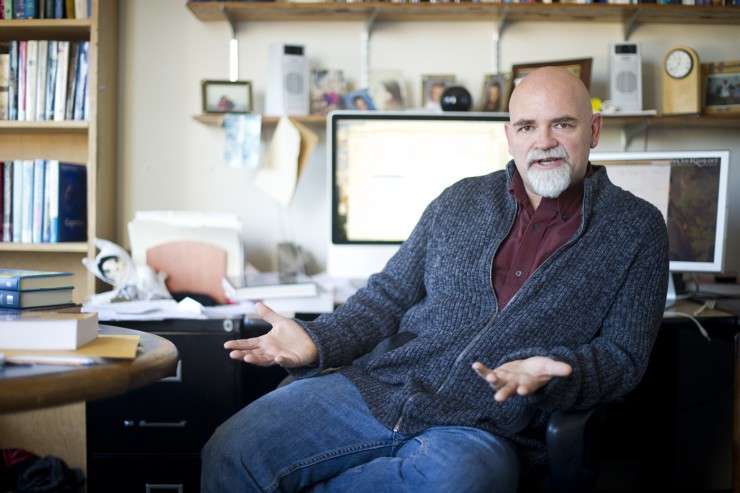Why biology students have misconceptions about science

Zebras developed stripes to avoid predators.
No, that statement wasn't ripped from the annals of "Who Wants to Be a Millionaire?" It's an example of a "misconception"—a term biology-education researchers use to describe a scientifically inaccurate idea held by biology students, even majors in the field.
In fact, new research by Northeastern associate professor John Coley and his team has found that both biology and non-biology majors are equally prone to agreeing with common scientific misconceptions. The difference is that biology majors give more systematic reasons for why they agree or disagree with the inaccurate ideas presented to them—a finding that points to the way they are taught science.
The findings, published earlier this year in CBE-Life Sciences Education, could change the way instructors teach science—and improve how students learn it.
Misconceptions come from intuitive thinking
In the study, Coley and his team surveyed Northeastern University students, both biology majors and non-biology majors, about whether or not they agreed with several scientific ideas—which unbeknownst to the students were inaccurate. Their study yielded some startling results, namely that biology majors agreed with common scientific misconceptions nearly as frequently as non-biology majors. But interestingly, biology majors were much more systematic in their reasoning for agreeing or disagreeing with these ideas—which the researchers say indicates that biology education itself is reinforcing these intuitive ways of thinking.
"A misconception is not just a factual error," says Coley, a psychologist in the College of Science who studies cognition. "It's a belief that, while contrary to how scientists understand a phenomenon, arises from our intuitive ways of organizing knowledge."
From evolution to cell biology, biology and non-biology majors agreed nearly to the same degree, differed on reasons
To dive deeply into the minds of biology students, Coley teamed up with Kimberly Tanner, a neurobiologist at San Francisco State University trained in science-education research. The study, which represents a breakthrough in interdisciplinary research, examines the thought processes driving students' misconceptions across biological disciplines, from evolution to ecology to cell biology.
The authors hypothesized that seemingly unrelated biological misconceptions—about cellular respiration, say, or plant nutrition—sprang not from the complexity of the material but from our intuitive ways of understanding the world. They posited three types of intuitive thinking: cause-effect driven ("zebras developed stripes for protection"), conflating internal properties with external features ("different cells have different DNA"), and imbuing nonhuman species with human characteristics ("plants get food from the soil").
To test their hypothesis, they asked 137 Northeastern undergraduates—69 biology majors with AP biology credit and 68 non-majors with non-science AP credit, to show comparable accomplishment—to indicate their level of agreement with six biological misconceptions, each linked to a type of intuitive thinking. They also asked the students to write down their reasoning.
The results were astonishing. The difference between how frequently both biology and non-biology majors agreed with misconceptions was "surprisingly small," says Coley, with 93 percent of biology majors and 98 percent of non-majors agreeing with at least one misconception. And both groups employed varied types of intuitive thinking. Remarkable—"amazing to me!" exclaims Tanner—was the tight correlation only among the biology majors between the type of reasoning they employed (say, cause-effect driven) and the type of misconception they agreed with ("zebras developed stripes to avoid predators").
The non-biology majors were "kind of promiscuous," notes Tanner, while the biology majors were far more systematic. "That suggests that biology education itself—the way students learn the subject—is reinforcing these intuitive ways of thinking and, potentially, reinforcing the misconceptions as well."
These are not isolated misunderstandings
Next, Coley and Tanner will look at students as they advance through their biological studies and at how biology teachers present information in the classroom. "Our work shows that these are not isolated misunderstandings, which is how they've been viewed," says Coley, "but rather that there are systems of misconceptions—all generated from underlying intuitive ways of thinking."
One way to counteract those systems, says Coley, would be to make students "explicitly aware," in the first week of an introductory class, of basic principles of cognitive science. "Intuitive ways of thinking are deeply embedded in our cognitive systems, and they're useful in everyday contexts," says Coley. "But they are not appropriate for explaining scientific phenomena.
"We need to help students think hard about how cognition works, not just in terms of how we memorize material, but in terms of how we organize knowledge in different domains."
So about those zebras
Thinking that zebras got stripes to dodge predators, Coley says, is an example of a misconception arising from a particular type of intuitive thinking: Our minds automatically attribute cause and effect to phenomena or events, even when there might be none.
But evolution doesn't involve "forward thinking," or intention—ancestral zebras didn't sprout stripes to blend in with their surroundings. Rather, given a population of zebra-like animals varying in stripedness, those with abundant verticals had a selective advantage over their plainer relatives: Hence, they were more successful at reproducing, and over time, the stripes prevailed.
More information: "Common Origins of Diverse Misconceptions: Cognitive Principles and the Development of Biology Thinking." CBE—Life Sciences Education, Vol. 11, 209–215, Fall 2012. www.lifescied.org/content/11/3/209.full.pdf
Provided by Northeastern University


















